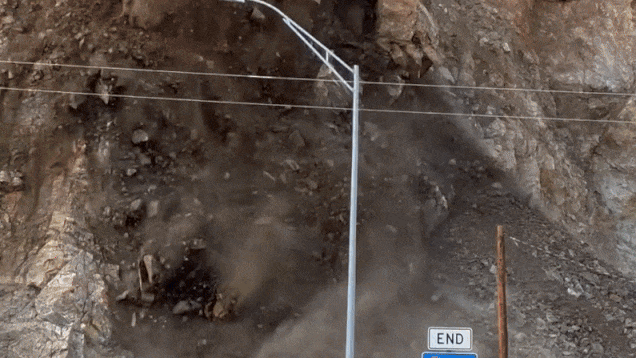Watch: Massive rockslide buries Colorado highway
2 min read
Driver watches as the side of mountain buries parts of Colorado highway (Video: Sierra Wright via Storyful)
CUSTER COUNTY, Colo. – Cameras were rolling when a massive rockslide buried a Colorado highway Sunday.
Sierra Wright was approaching the intersection of Highway 96 and 165 near Westcliffe when she noticed people were stopping to take photographs of the budding rockslide.
“We had seen that there were already a couple of rocks in the highway,” Wright said. “That’s when we pulled over and my friend got out to start helping direct traffic and call 911.”
Then the slide began increasing in intensity.

Rockslide on Colorado highway buries road in rock and debris Dec. 29.
(Sierra Wright via Storyful / FOX Weather)
“There was a moment where I was like, we are a little too close,” she said. “That’s when we backed up on (Highway) 165 to get away and also stop traffic.”
The rocks continued to slowly fall down the mountain, and then suddenly much larger chunks of rock collapsed, leaving a cloud of dust and burying the road.
Luckily, no one was injured.
Crews began removing rock and debris Tuesday.
“The fault zone is called the Ilse (ILSE) and it is an ancient fault zone. It was active as long as a billion years ago or more,” Mapping Geologist Jay Temple told the Custer County sheriff’s office on Monday. “It’s not active now, or at least it may settle occasionally, but it is not a technically active fault.”
According to the USGS, “A fault is a fracture or zone of fractures between two blocks of rock. This type of movement can occur rapidly, like an earthquake. Or slowly in the form of a creep.”
DISASTER DECLARED IN ALASKA AFTER DEADLY LANDSLIDE DESTROYS HOMES IN KETCHIKAN
A creep is steady fault movements that can last minutes or days. The depth of a creep can be as deep as seven miles in the ground.
https://static.foxweather.com/www.foxweather.com/content/uploads/2025/01/colorado_rockslide.gif
2025-01-02 23:06:50







